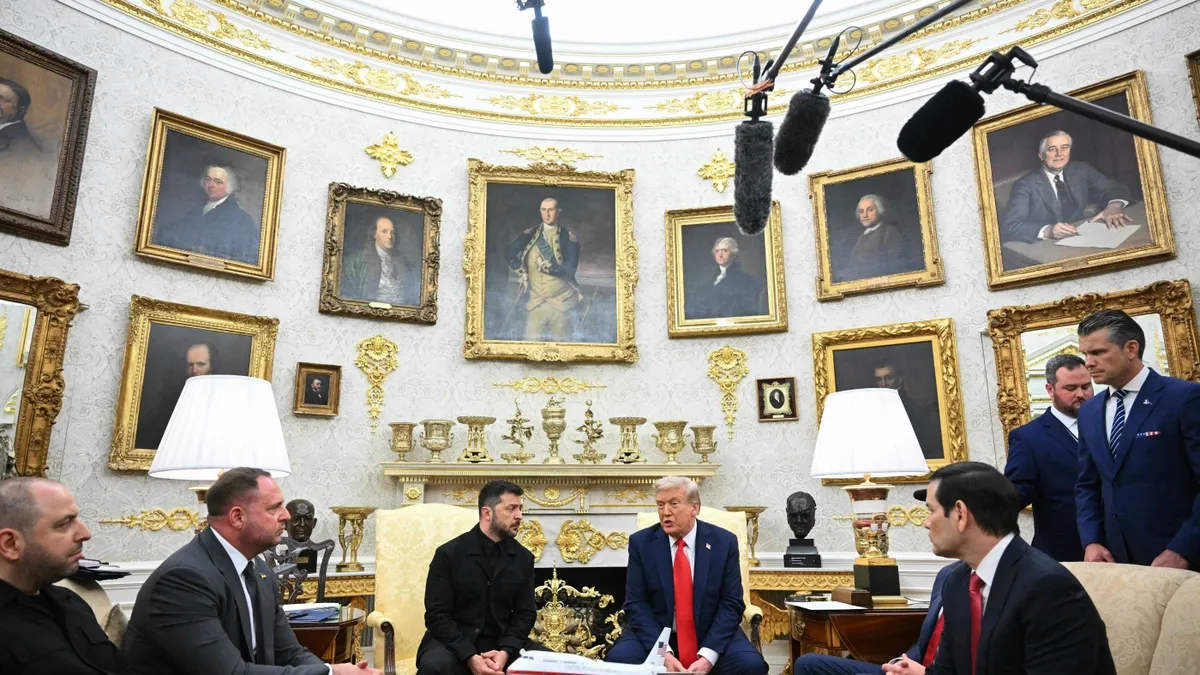
On Monday, in a pivotal meeting at the White House, Ukrainian President Volodymyr Zelenskyy and a delegation of top European leaders engaged with President Trump to discuss critical security guarantees amidst the ongoing conflict between Ukraine and Russia. This meeting aimed to explore potential solutions to end the three-and-a-half-year war that has devastated the region.
During the afternoon discussions, President Trump expressed optimism that a trilateral meeting involving Ukraine, Russia, and the U.S. could pave the way for a peaceful resolution to the war. "We're going to work with everybody, and we're going to make sure that if there's peace, the peace is going to stay a long time," Trump stated. He emphasized the role of European nations as the first line of defense in maintaining regional peace, with the U.S. poised to provide substantial support.
Trump highlighted that the U.S. would focus on arms sales to Ukraine and other European allies rather than offering direct aid, sidestepping questions about the potential involvement of U.S. troops in any security agreements. These discussions followed a summit between Trump and Russian President Vladimir Putin in Alaska, where both leaders claimed progress was made, despite a lack of tangible outcomes.
For Zelenskyy, this meeting marked a significant return to the White House since February, when he faced criticism from Trump and Vice President JD Vance before leaving abruptly. The atmosphere during this meeting was markedly more positive, with Zelenskyy expressing gratitude to Trump for his efforts to halt the violence. "Thank you very much for your efforts, personal efforts, to stop killings and stop this war," said Zelenskyy, reflecting a shift in diplomacy.
The meeting also featured a robust representation of European leaders, including British Prime Minister Keir Starmer, European Commission President Ursula Von der Leyen, French President Emmanuel Macron, and NATO Secretary General Mark Rutte, among others. This united front aimed to prevent Trump from pressuring Zelenskyy into an unfavorable agreement with Russia.
European leaders were particularly concerned about suggestions of a land swap, which Zelenskyy has previously opposed, and sought to ensure that any discussions about security guarantees would effectively prevent future Russian aggression. Trump proposed that Ukraine and Russia discuss possible territorial exchanges, but Zelenskyy focused on the need for robust security measures from the U.S. and European allies.
Zelenskyy described his discussions with Trump as constructive, emphasizing the importance of unity among allies. "We had a constructive, specific meeting … we are happy we have such big unity today," he remarked. European leaders echoed this sentiment, with Rutte stating, "I think, if we play this well, we could end this." The collective commitment to security cooperation was seen as a significant breakthrough.
Amidst these discussions, questions arose regarding Trump's evolving stance on a ceasefire. Prior to the Alaska summit, he had advocated for a ceasefire and warned of consequences for Russia if hostilities continued. However, following his meeting with Putin, Trump appeared to shift his focus towards advocating for a comprehensive peace agreement, aligning more closely with Putin's position. Some European leaders, including German Chancellor Merz and President Macron, stressed the necessity of a ceasefire as a foundation for serious negotiations, urging Trump to exert pressure on Russia for a halt to hostilities.
As the talks concluded, the emphasis remained on unity and the importance of collaborative efforts to achieve lasting peace in the region. The outcome of these discussions could significantly impact the future of U.S.-Ukraine relations and the ongoing conflict with Russia.